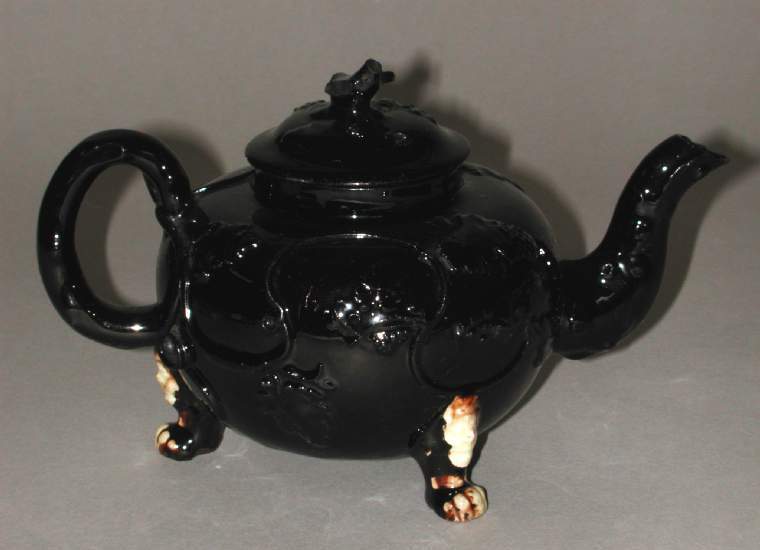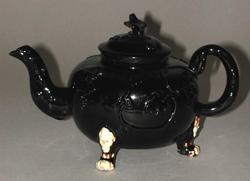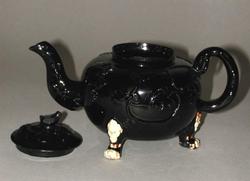Current Location: In storage
Maker(s)
Factory:
Unidentified Staffordshire Pottery
Entities
Categories
Description
Earthenware with applied reliefs and blackish glaze.
Earthenware appearing dark brown covered with a thick, blackish glaze. The squat, globular wheel-throne body has a crabstock handle and three free, moulded to resemble paws with lion masks. The body is decorated with sprigged reliefs of vines, leaves and bunches of grapes, which bear traces of now-lost gilding. The lid also features sprigged vine motifs and the knob is a press-moulded flying bird. The feet are highlighted with white slip.
Notes
History note: Provenance unidentified before sale at Sotheby’s about 1898, when it was bought by Dr J.W.L. Glaisher, FRS, Trinity College, Cambridge
Legal notes
Dr J.W.L. Glaisher Bequest
Measurements and weight
Width: 18.6 cm
Acquisition and important dates
Method of acquisition: Bequeathed
(1928-12-07)
by
Glaisher, J. W. L., Dr
Dating
18th Century, Mid
George II
George III
Circa
1750
CE
-
Circa
1765
CE
Note
Black wares were typically produced by biscuit firing a dark red-brown clay body covered by a thick blackish-brown lead glaze. Sometimes the wares were further blackened through the use of a dark-coloured slip. Archaeological evidence suggests that black wares, particularly ones associated, like this teapot, with the preparation and drinking of tea, were among the most common products of many potters in Staffordshire and across England from around 1750 to 1765; in the later 1760s, there popularity declined significantly. The use on this teapot of simple vine motifs and a crabstock handle and spout is typical of black wares of the late 1750s and early 1760s.
Components of the work
Reliefs
composed of
gold
( only traces remain)
Body Without Lid
Height 10.5 cm
Body With Lid
Height 11.3 cm
Body
Feet
Handle
Knob
Spout
Materials used in production
Lead-glaze
Earthenware
Techniques used in production
Lead-glazing
References and bibliographic entries
Identification numbers
Accession number: C.710 & A-1928
Primary reference Number: 75875
Old catalogue number: 721
Stable URI
Audit data
Created: Saturday 6 August 2011
Updated: Tuesday 30 April 2024
Last processed: Thursday 14 August 2025
Associated departments & institutions
Owner or interested party:
The Fitzwilliam Museum
Associated department:
Applied Arts






